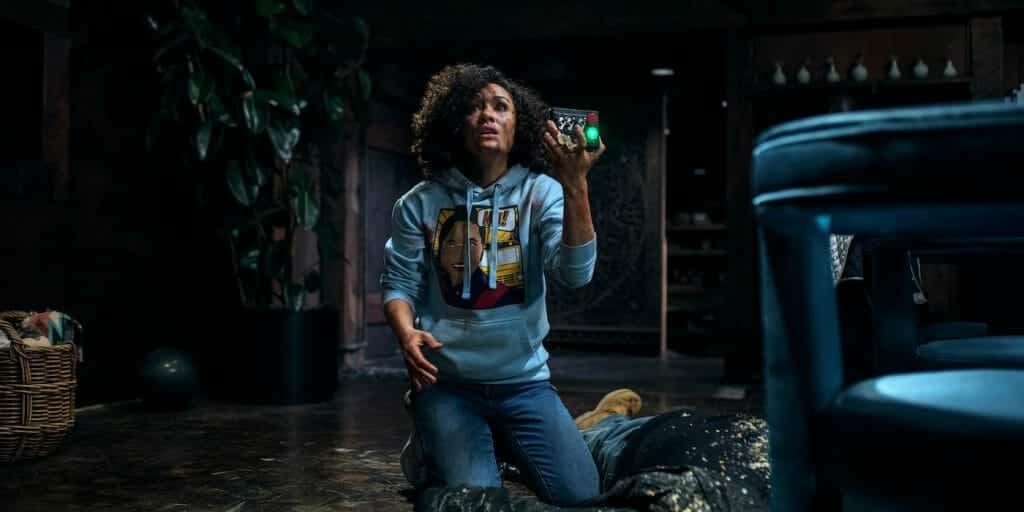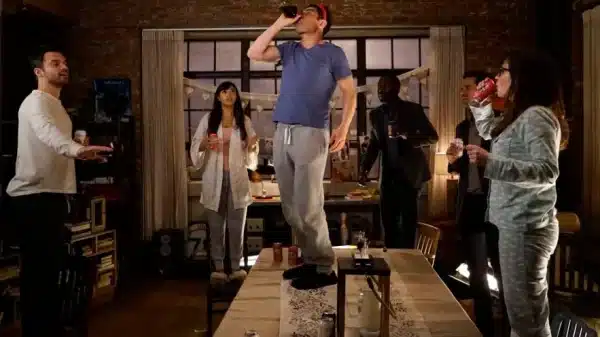Man, let me tell you about The Blackening’s ending. It’s like a powerful punch straight to your soul, challenging every stereotype and showing just how diverse and complex the Black community can be.
It’s a wake-up call, making you realize that you can’t put Blackness in a box or define it with some shallow standards. Nah, it’s way more than that. It’s a whole spectrum of identities, experiences, and backgrounds coming together.
What’s cool is how The Blackening flips the script on those tired horror clichés. Instead of the same ol’ white actors, we got Black characters taking center stage in roles you wouldn’t expect. It’s like a breath of fresh air, you know? By doing that, the movie dives deep into questions of identity, unity, and what it’s like to be part of a marginalized community.
The survivors in that ending, man, they find strength in their togetherness. They realize that their uniqueness is something to celebrate, not tear each other down over. It’s a powerful message, reminding us all to embrace diversity within the Black community and kick that monolithic Black experience idea to the curb.
Now, I gotta say, there might be a sequel in the works. But even if there isn’t, The Blackening’s ending stands tall on its own, exploring Black identity and solidarity like a boss. It’s not just about entertaining and thrilling us—it sparks conversations about representation, stereotypes, and the beautiful complexity of being Black.
The way The Blackening blends horror, comedy, and social commentary is straight-up genius. It shakes things up in the genre and gives us a fresh perspective. By breaking the mold and letting a diverse cast shine, the film adds to the ongoing discussion about representation and inclusion in the entertainment biz.
When you walk away from The Blackening’s ending, you can’t help but appreciate the layers of the Black experience. It’s a reminder that there’s no one-size-fits-all way to be Black. We should be celebrating and embracing our differences, man. The movie’s legacy isn’t just about entertainment—it’s about pushing for a more inclusive and representative film world.
But let me tell you, The Blackening’s impact goes beyond the silver screen. It hits hard and resonates with folks, sparking crucial discussions about representation and inclusivity in the industry. By putting diverse Black characters front and center in a horror-comedy mix, The Blackening smashes preconceived notions and gives us a fresh take on Black life.
That ending, man, it fills you with hope and power. Those survivors, Dewayne, Lisa, Nnamdi, King, Allison, and Shanika, they show us what resilience and unity look like when the world’s against you. They’re laughing and joking, considering calling the firefighters instead of the police. It’s a big middle finger to the oppressive systems that have held us down for too damn long. The film challenges us to rethink the status quo and find new ways to navigate our lives.
And guess what? The Blackening’s ending leaves the door wide open for sequels or spin-offs. We could dive deeper into the aftermath of the friends’ survival, with the Connor family seeking revenge and all that. It’d be a chance to dig even deeper into race, identity, and community, while smacking down more stereotypes and expectations.
This movie’s success, man, it’s paving the way for a whole new era of storytelling. It shows that people crave narratives that celebrate our differences and explore the beauty of different cultures and identities. The mix of horror and comedy, combined with that thought-provoking social commentary, has struck a nerve. We want more inclusive and authentic stories on the big screen, and The Blackening is leading the charge.
But here’s the thing—The Blackening ain’t just contained within those theater walls. It’s a spark that lights fires everywhere. It’s got us talking about the need for diverse perspectives and stories in all forms of media. It’s a call to action, urging filmmakers and studios to embrace inclusivity and create a fairer industry for everyone.
So, in a nutshell, The Blackening’s ending ain’t just about revealing the killer’s identity. It’s about diving deep into Blackness, unity, and individuality. By challenging stereotypes, celebrating diversity, and sparking crucial conversations, this film has left an indelible mark. It’s a reminder that representation matters and that there’s incredible power in telling stories that reflect the vibrant tapestry of human experiences.














